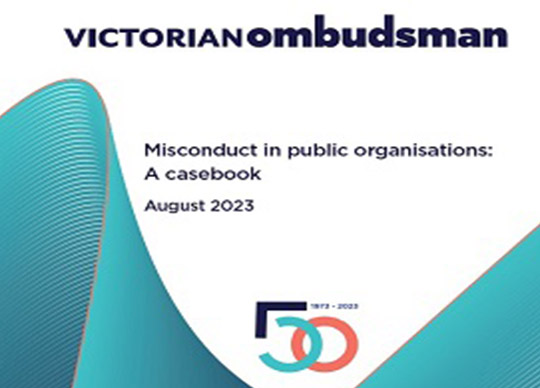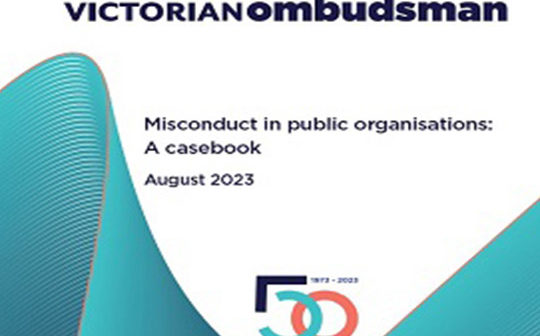
“I don’t think the public sector should pay for funerals” – a senior staff member on learning their public organisation spent over $30,000 on funeral expenses for employees who died in circumstances unrelated to their work.
Investigating allegations of misconduct is a significant and crucial part of the Victorian Ombudsman’s work, but many cases are never publicly reported, including to safeguard individuals’ wellbeing.
Victorian Ombudsman Deborah Glass’s report, Misconduct in public organisations: A casebook, sheds some light on her investigations into misconduct within the public sector.
The report delves into seven case studies, discussing individuals engaging in misconduct and systems failing to manage misconduct risks.
This report educates and informs public organisations and the Victorian community about the risks associated with misconduct while sharing instructive guidance on how to mitigate those risks.
Ombudsman Deborah Glass emphasised the importance of this report, stating, “Its themes are, sadly, not new. Conflicts of interest, favouritism, and misuse of public funds continue to feature, as they have in previous Ombudsman reports. But the stories are different, and each holds valuable lessons from which others can learn. Sometimes people do the wrong thing and go to great lengths to conceal it, such as the manager who took over 40 days of paid leave without submitting a leave request, even going so far as to feign attendance at an off-site meeting.”
“In other cases, individuals simply fail to recognise their own misconduct. Conflicts of interest, in particular, remain poorly understood by many people in public roles. Public funds may be misused due to opportunistic behaviour exploiting an organisation’s weak financial controls or an organisational culture that allows poor conduct to persist unchecked.” Ms Glass said.
Misconduct, by its very nature, erodes public trust in publicly funded organisations. “Public trust – striving to earn and sustain it – is a vital challenge for the public sector.” added Ms Glass.
While the potential for people to engage in wrongful acts will always exist, this report equips organisations with practical strategies to minimise misconduct and preserve or rebuild public trust.
Case studies:
- The Chair of a Cemetery Trust colluded with a local Gardener hired to dig graves. The other members of the Cemetery Trust were not aware that the Chair diverted half the grave digging fees to their private business.
- A government organisation failed to declare $33,000 worth of consultancy fees in its annual report and used an ‘off-book’ bank account for certain payments, which had the effect of hiding these payments from scrutiny. Within the culture of the organisation, such behaviour was seen as justifiable and many management staff knew about the improper practices.
- An organisation used public money to pay for staff gifts, alcohol, fines and funeral-related expenses with no legitimate business reason to do so. The organisation bought crystal bowls for ‘long service awards’ and spent more than $30,000 on funeral and memorial costs for staff who died in circumstances unrelated to their employment.
- Over several years, a public sector officer was the subject of a number of processes which examined their conduct. Misconduct was substantiated against them in more than one case and in one case the allegations remained unresolved because the officer resigned while under investigation. When later recruited to a senior Executive role at a Department, the officer failed to disclose all these events. A Manager working at a government organisation gave a job to a close friend. The Manager was put in charge of recruitment for a role their friend wanted. They made decisions about the Position Description and advertising strategy, formed and chaired the interview panel and checked references. In several ways, the Manager failed to follow the standard recruitment process which advantaged their friend.
- A Manager at a government Department repeatedly took time off work without approval. The Manager also worked flexible hours without having arrangements for this in place and pretended they had attended an off-site meeting. The Manager was paid for 40 days’ worth of time when they were not working.
- A school employee used the school’s Coles online account to buy $1,225 worth of groceries for themselves and a non-school sporting team while interstate for a competition. We uncovered other payments during our investigation for personal expenses the employee had paid for with school funds.
You can read the full report here.






